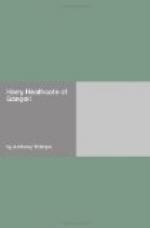The tricks which the Brownbies played with cattle were notorious throughout Queensland and New South Wales, and by a certain class of men were much admired. They would drive a few head of cattle, perhaps forty or fifty, for miles around the country, across one station and another, traveling many hundreds of miles, and here and there, as they passed along, they would sweep into their own herd the bullocks of the victims whose lands they passed. If detected on the spot, they gave up their prey. They were in the right in moving their own cattle, and were not responsible for the erratic tendencies of other animals. If successful, they either sold their stolen beasts to butchers on the road, or got them home to Boolabong. There were dangers, of course, and occasional penalties. But there was much success. It was supposed, also, that though they did not own sheep, they preferred mutton for their daily uses, and that they supplied themselves at a very cheap rate.
It may be imagined how such a family would be hated by the respectable squatters on whom they preyed. Still there were men, old stagers, who had know Moreton Bay before it was a colony—in the old days when convicts were common—who almost regarded the Brownbies as a part of the common order of things, and who were indisposed to persecute them. Men must live; and what were a few sheep? Of some such it might be said, that though they were above the arts by which the Brownbies lived, they were not very scrupulous themselves; and it perhaps served them to have within their ken neighbours whose morality was lower even than their own. But to such a one as Harry Heathcote the Brownbies were utterly abominable. He was for the law and justice at any cost. To his thinking, the Colonial Government was grossly at fault, because it did not weed out and extirpate not only the identical Brownbies, but all Brownbieism wherever it might be found. A dishonest workman was a great evil, but, to his thinking, a dishonest man in the position of master was the incarnation of evil. As to the difficulties of evidence, and obstacles of that nature, Harry Heathcote knew nothing. The Brownbies were rascals, and should therefore be exterminated.
And the Brownbies knew well the estimation in which their neighbour held them. Harry had made himself altogether disagreeable to them. They were squatters as well as he—or at least so they termed themselves; and though they would not have expected to be admitted to home intimacies, they thought that when they were met out-of-doors or in public places, they should be treated with some respect. On such occasions Harry treated them as though they were dirt beneath his feet. The Brownbies would be found, whenever a little money came among them, at the public billiard-rooms and race-courses within one hundred and fifty miles of Boolabong. At such places Harry Heathcote was never seen. It would have been as easy to seduce the Bishop of Brisbane into a bet as Harry Heathcote. He had never even drank a nobbler with one of the Brownbies. To their thinking, he was a proud, stuck-up, unsocial young cub, whom to rob was a pleasure, and to ruin would be a delight.




